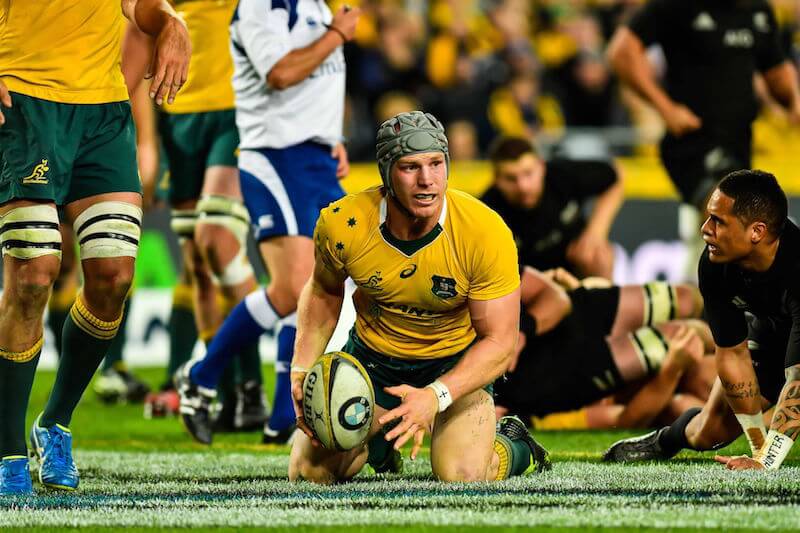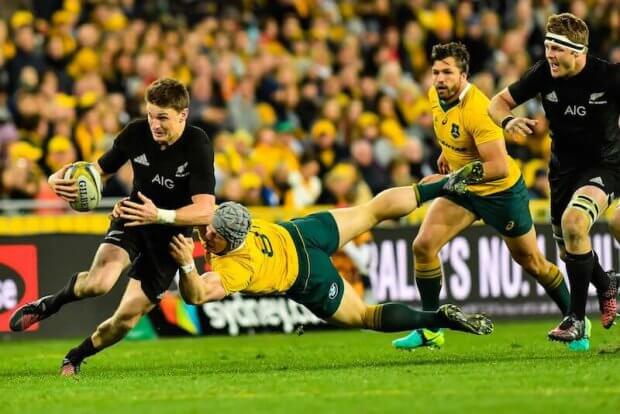History will be made at Eden Park on Saturday night. Either the All Blacks will acheive their 18th consecutive victory to establish a new record for a Tier 1 nation, or the Wallabies will become the first visiting team to win on New Zealand soil since 2009 and at Eden Park since 1994. Australia last won at Eden Park in 1986 and it’s been 15 years and 18 matches since they last won at any New Zealand venue.
FORM
As mentioned above the All Blacks are unbeaten in their last 17 outings. Add to that their last 36 at Eden Park, and their last 44 at home. Included in the current winning streak are 42-8 and 29-9 victories in the first two Bledisloe Cup matches for 2016. Their other Rugby Championship opponents fared no better, Argentina beaten 57-22 and 37-16, and South Africa 41-13 and a record 57-15.
The Wallabies meanwhile are three from nine this year. 2016 began with a 0-3 whitewash at the hands of England and continued with the afore-mentioned back to back Bledisloe losses before a late revival with three wins, 23-17 against South Africa at home, and Argentina 36-20 at home and 33-21 away. Should they lose on Saturday it will be the first time they’ve ever lost three matches against two different opponents in the same year.
LAST TIME THEY MET (UNDER SIMILAR CIRCUMSTANCES)
The All Blacks went into the opening game of the 2014 Rugby Championship and Bledisloe Cup series having won their previous 17 matches. They were widely expected to extend that to 18 but a superb defensive effort saw the Wallabies have the better of a 12-all draw. Coach Ewen McKenzie was left lamenting the inability of his team to take full advantage of the opportunities they created, and rookie captain Michael Hooper was widely criticised for turning down several kickable penalties, any one of which could have won the game.
TEAM NEWS
The big news out of the Wallaby camp is the sooner than expected return of David Pocock after hand surgery, he will come off the bench. Sean McMahon’s ankle injury, however, will keep him out. As the match sits outside World Rugby’s September/ October international window, Will Genia has returned to his French club. The Wallabies have made a swag of changes to their backline, mostly appearing to be based around the move of Foley back to 10 to partner Phipps. This opens the door for Hodge to move into the centres with Kerevi. Cheika has then filled the open wing position with Henry Speight, playing his first international of the year.
There are three changes to the All Black 23 from Durban, all in the backs. Julian Savea is preferred to Waisake Naholo on the wing, replacement 5/8 Aaron Cruden returns from injury in place of Lima Sopoaga, and Malakai Fekitoa will be the bench in place of George Moala. Halfback Aaron Smith’s very public airport toilet shenanigans see him sidelined again, this time at his request. Augustine Pulu has been released for Mitre 10 Cup semi final duty along with Naholo and flanker Sam Cane.

KEY MATCH-UPS
Australia’s scrum has improved hugely over the past few seasons but the lineout has become a major weakness. In the Championship they won only 80% of their own ball (All Blacks 93%). Constantly changing the jumpers (seven different locking combinations in nine matches) doesn’t help but it’s evident that Stephen Moore’s throwing is at least part of the problem as the success rate improves by several percent after he’s subbed off. A young lock pairing of Arnold and Coleman might have the likes of Whitelock and Retallick licking their lips.
The teams are more evenly matched at the breakdown. The All Blacks prefer to commit no more than three or four players and forcing them to commit more with plenty of one-off runners and pick-and-goes is a sure way to disrupt their structure. Whether Australia has the ball carriers to do it will be the question as they had the fewest carries (and consequently fewest metres carried) in the Championship.
With Will Genia back in France the pressure goes back on the two Nicks, Phipps and Frisby, to spark the Wallabies backs. Both have had issues this year with slow and/ or erratic service. The absence of Aaron Smith didn’t appear to affect the All Blacks much (if at all) in South Africa, TJ Peranara continuing his fine Super Rugby form.
For Australia so much depends on The halves pairing of Phipps and Foley. If Phipps is able to get quick and clean ball to Foley there is the opportunity for Foley to put his centres through the line. However Foley’s kicking will again be under scrutiny and the All Blacks will likely pressure any kicks in play, knowing that it is a possible weakness. One would think the Wallabies view Beauden Barrett as a more attacking threat and will detail someone – presumably Hooper – to be in his face all night.
A year ago Israel Dagg was rightly left out of the World Cup squad and there was talk of him heading offshore while he could still cash in on his All Black status. Today he has the wing/ second fullback role previously filled by Ben Smith and Cory Jane locked down and is reportedly being offered big money by Toulon. The other Israel’s trajectory has generally been in the opposite direction and he owes Michael Cheika a big performance for persevering with him for so long when he’s clearly out of form, and appears to be carrying an injury
GAME PLANS
Australia now have the long-kicking option they lacked earlier in the season but will have to use it selectively and accurately if they’re to avoid simply feeding the All Blacks possession. If they’re going to kick it should be towards Savea’s wing and with plenty of chasers to shut down any counter-attack. Drawing as many All Black defenders as possible into the breakdown area would be another good tactic, though as mentioned above it’s questionable whether Australia have the ball carriers to do it, and as Argentina will attest it’s hard to sustain for 80 minutes.
New Zealand will look to do what they’ve been doing all year: play the game in the opposition half, win the collisions and shift the point of attack quickly, whether through the hands or off the boot. Rinse and repeat until the defence can’t reset quickly enough and/ or there are defenders out of position, then go for the kill. Google “analysis south Africa’s 40 missed tackles” to see this done at its clinical best.
PREDICTION
The Bledisloe Cup and Rugby Championship trophy are safely locked away, there’s no looming World Cup distractions, and a chance to re-write the history books. Many of the senior players were there when Australia ended New Zealand’s last 17-match streak, they’ll be wanting this badly.
All Blacks by 12-19.
MATCH DETAILS
Venue: Eden Park, Auckland – 19:35 NZDT (17:35 AEDT) 22 October
Referee: Nigel Owens
Assistant Referees: Craig Joubert & Marius van der Westhuizen
TMO: Shaun Veldsman
New Zealand:
15 Ben Smith, 14 Israel Dagg, 13 Anton Lienert-Brown, 12 Ryan Crotty, 11 Julian Savea, 10 Beauden Barrett, 9 TJ Perenara, 8 Kieran Read (c), 7 Matt Todd, 6 Jerome Kaino, 5 Samuel Whitelock, 4 Brodie Retallick, 3 Owen Franks, 2 Dane Coles, 1 Joe Moody.
Replacements: 16 Codie Taylor, 17 Wyatt Crockett, 18 Charlie Faumuina, 19 Liam Squire, 20 Ardie Savea, 21 Tawera Kerr-Barlow, 22 Aaron Cruden, 23 Malakai Fekitoa
Australia:
15 Israel Folau, 14 Dane Haylett-Petty, 13 Samu Kerevi, 12 Reece Hodge, 11 Henry Speight, 10 Bernard Foley, 9 Nick Phipps, 8 Lopeti Timani, 7 Michael Hooper, 6 Dean Mumm, 5 Adam Coleman, 4 Rory Arnold, 3 Sekope Kepu, 2 Stephen Moore (c), 1 Scott Sio
Replacements: 16. James Hanson, 17. Tom Robertson, 18. Allan Alaalatoa, 19. Rob Simmons, 20. David Pocock, 21. Nick Frisby, 22. Quade Cooper, 23. Sefa Naivalu


